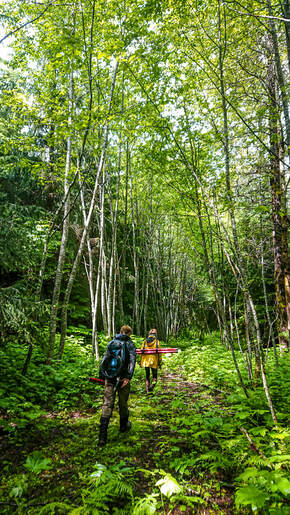 Five Indigenous communities on the north and central coast will join B.C.’s clean-energy sector with local projects following support from the Province. The Province is partnering with Indigenous communities throughout B.C. to work toward a low-carbon future by providing funding from the First Nations Clean Energy Business Fund (FNCEBF). The fund helps develop clean-energy projects driven and owned by Indigenous communities in areas such as solar, ocean thermal, wind energy, biomass, run-of-river hydroelectric power, energy-efficiency planning and other clean energy-related areas. A key goal of the fund is to increase the participation of Indigenous communities in B.C.’s clean-energy sector. The FNCEBF provides Indigenous communities with clean-energy support in the areas of studies and planning, equity funding and revenue sharing. Two projects on Haida Gwaii have received funding under the FNCEBF: the Tll Yahda Energy solar-farm project with Skidegate First Nation and the Northern Haida Gwaii Hospital heating project supported by the Old Masset Village Council. The fund will provide each project $400,000 in equity funding, which will help Haida Gwaii shift from reliance on diesel-generated power to renewable energy. Three other Indigenous communities located on the central and north coast received funding in 2021:
In 2021, the fund provided more than $3.8 million to support new capacity and equity projects in 27 Indigenous communities throughout the province. The FNCEBF is accepting applications for the next intake until Jan. 31, 2022. The FNCEBF aligns with the Province’s CleanBC Roadmap to 2030, which aims to create a balanced, sustainable future for climate action and the economy. Quick Facts:
First Nations Clean Energy Business Fund: http://ow.ly/JPz530apMVd Clean Energy BC: www.cleanenergybc.org/ Heiltsuk heat pump project video: https://www.youtube.com/watch?v=snD_ZG1D0eY&ab_channel=EcotrustCanada Quotes: Murray Rankin, Minster of Indigenous Relations and Reconciliation – “We’re working to support First Nations in developing clean-energy alternatives, especially in remote communities. The First Nations Clean Energy Business Fund continues to be a great resource to strengthen Indigenous participation in the clean-energy sector and support energy-efficient, resilient communities in their transition to a low-carbon future.” Bruce Ralston, Minister of Energy, Mines and Low Carbon Innovation – “Partnerships between industry and First Nations play an important part in building a low-carbon economy with new clean-energy jobs, while also improving quality of life in remote areas of B.C. Supporting First Nation communities in becoming more energy efficient provides a direct and sustainable path to achieving CleanBC’s climate targets.” Jennifer Rice, MLA for North Coast – “People know that we are going to need more clean energy to combat climate change, and it’s great to see First Nations on the North Coast leading that work. These clean-energy projects will help phase out fossil fuels and create sustainable jobs for more people.” David Try, chair, Kitselas Geothermal Inc. – “Kitselas First Nation is grateful to be supported by the B.C. Ministry of Indigenous Relations and Reconciliation’s First Nations Clean Energy Business Fund for our renewable geothermal energy project Fuel for Reconciliation. Kitselas Geothermal Inc. has been developing this project since 2014 and has injected millions of dollars into the economy in and around our traditional territory near Terrace. The funding will be a tremendous help in progressing the project’s 2022 field season. “Decentralized energy projects have the potential to create local jobs, advance technology, develop skills and decrease the environmental impact of our energy choices. Fuel for Reconciliation is poised to deliver both geothermal energy and greenhouse gas reductions on the north coast, benefiting many stakeholders.” Kevin Brown, climate action co-ordinator, Old Masset Village Council – “Our district heat project is an awesome example of an alternative to fossil-fuelled heating. Developing a local fibre fuel from waste wood fuels this business model.” Leona Humchitt, climate action co-ordinator, Heiltsuk Nation – “The Haíɫzaqv words for clean energy are ɫáxváika'aus qṇts wáxv'w̓uísáx̌ - the power that comes from our territories, which includes solar, hydro, tidal, wind and geothermal. Wáxv'w̓uísá is an all-encompassing word that’s closest translation is environment. The Haíɫzaqv do not divide our natural world into pieces: everything is one. We are a part of the wáxv'w̓uísá, therefore, we are responsible to it. Our responsibility to our land, water, sky and other living things is our ultimate responsibility. This teaching is what gives our climate action work its power. “Our community members are already beginning to experience the shift towards a clean-energy future with many of our homes experiencing lower energy bills, better air quality and more efficient homes and heating systems with our heat-pump project. Many First Nations communities suffer poverty. One of our Elders said, ‘Thank you so much for my heat pump, I forgot what heat felt like.’ It’s statements like these that propel our desire and goal to ensure every home is retrofitted with this source renewable energy. “The Hailzaqv Nation and our allies at Ecotrust Canada are grateful to the Province for supporting our Heiltsuk Heat Pump Project. Cumulatively, with other revenue streams, we have now retrofitted 154 homes with heat pumps. Our goal is to retrofit all 420 residential units.” Source Comments are closed.
|
|
CONTACT
Kitselas Geothermal Inc.
4562-J QUEENSWAY DRIVE TERRACE, BC V8G 3X6 |
KITSELAS GEOTHERMAL IS A COLLABORATION OF
|
DISCLAIMER:
The term “geothermal resource” and any other associated terms including but not limited to “geothermal reservoir” and “geothermal energy” generally describe heat or a reservoir of heat that exists at depth in the subsurface of the Earth. Use of these terms by Kitselas Geothermal Inc. follows the legal definition of the term ‘geothermal resource’ and any other legal definitions as found in British Columbia’s Geothermal Resources Act, RSBC 1996, c 171 and its associated regulations.
The term “geothermal resource” and any other associated terms including but not limited to “geothermal reservoir” and “geothermal energy” generally describe heat or a reservoir of heat that exists at depth in the subsurface of the Earth. Use of these terms by Kitselas Geothermal Inc. follows the legal definition of the term ‘geothermal resource’ and any other legal definitions as found in British Columbia’s Geothermal Resources Act, RSBC 1996, c 171 and its associated regulations.


